Professional organizations such as NFPA, NALA, and NALS offer paralegals certification programs, continuing education, networking opportunities, and career advancement resources. Choose based on your practice area, experience level, and certification goals. Most exam-based certifications cost $250-$500, though some credential-based options have different fee structures, with annual maintenance fees typically ranging from $50-$200.
The paralegal profession operates within a framework of professional standards, ethics, and best practices maintained by several key organizations. While the paralegal field is largely unregulated by government, these professional associations fill that gap by setting education standards, offering certification programs, and providing resources that help paralegals advance their careers.
Whether you’re an aspiring paralegal researching education options or an experienced professional seeking certification, understanding these organizations helps you make informed decisions about your career path. Each organization offers unique benefits, including specialized certifications, continuing legal education, networking events, and career resources tailored to different practice areas and experience levels.
These organizations serve multiple roles: setting professional standards, providing continuing education opportunities, facilitating valuable networking, and administering certification programs that demonstrate competency and commitment to the profession. From membership associations that deliver trade publications and conferences to agencies that maintain education standards and certification programs, each organization contributes to the integrity and advancement of the paralegal profession.
Comparing Major Paralegal Organizations
Understanding the differences between paralegal organizations helps you choose the one that best fits your career goals. Here’s a side-by-side comparison of the major organizations, their certification programs, and what makes each unique.
| Organization | Primary Certification | Exam Cost | Best For | Key Benefits |
|---|---|---|---|---|
| NFPA | CORE Registered Paralegal (CRP), Registered Paralegal (RP) | $250-$350 | Corporate law, experienced paralegals seeking advanced credentials | Advanced specialty certifications, policy influence, nationwide recognition |
| NALA | Certified Paralegal (CP), Advanced Certified Paralegal (ACP) | $325 | Entry to mid-level paralegals, those seeking specialty focus | 26 specialty areas, comprehensive resources, largest membership base |
| NALS | Professional Paralegal (PP) | $275 | Law firm paralegals, legal secretaries transitioning to paralegal roles | Broader legal professional focus, state chapter networks |
| American Alliance | American Alliance Certified Paralegal (AACP) | No exam (credential-based) | Experienced paralegals with established education and work history | No exam requirement, experience-based certification |
| AALNC | Legal Nurse Consultant Certified (LNCC) | $395 | Registered nurses working in legal consulting | Specialized healthcare-legal expertise, nurse-specific resources |
Investment and ROI: Exam-based certifications typically cost $250-$500, while credential-based certifications, such as AACP, have different fee structures. Annual maintenance fees generally range from $50 to $200. Studies suggest certified paralegals may earn 10-15% more than non-certified counterparts, though this varies by region, employer, and practice area. Most paralegals spend 3-6 months preparing for certification exams while working full-time.
National Federation of Paralegal Associations (NFPA)

The National Federation of Paralegal Associations (NFPA), founded in 1974, was the nation’s first paralegal association. With approximately 8,000 members nationwide, this policy-focused organization drives professional standards and maintains strategic alliances with the American Bar Association (ABA), the American Association for Paralegal Education (AAfPE), and other key institutions to support unity and common education standards across the profession.
Professional Certification
NFPA offers professional certification at both basic and advanced levels, providing clear career progression paths for paralegals at different experience stages.
CORE Registered Paralegal (CRP)
To earn the CORE Registered Paralegal designation, you must pass the Paralegal CORE Competency Exam (PCCE) and meet one of these education or experience requirements:
- Associate’s degree in paralegal studies
- Associate’s degree in any subject, followed by a paralegal certificate
- Associate’s degree with at least 1 year of experience and six continuing legal education units, including 1 hour of ethics within the last year
- Bachelor’s degree in any subject, followed by a paralegal certificate
- Bachelor’s degree in paralegal studies
- Bachelor’s degree with at least 6 months of experience and 1 hour of ethics within the last year
- Active duty, retired, or former military personnel qualified as a paralegal, with 1 hour of ethics continuing legal education within the last year.
- Paralegal certificate with at least 1 year of experience and 6 hours of continuing legal education within the last year
- High school diploma or GED with at least 5 years of experience and 12 hours of continuing legal education, including 1 hour of ethics within the last 2 years
The PCCE exam consists of 125 multiple-choice questions completed in 2.5 hours. The exam is divided into questions about paralegal practice (52%) and substantive areas of law (48%). You must maintain your CRP credential by completing at least 8 hours of continuing legal education every 2 years, including at least 1 hour in legal ethics.
Registered Paralegal (RP)
For the advanced Registered Paralegal designation, you must pass the Paralegal Advanced Competency (PACE) Exam and meet one of these requirements:
- Associate’s degree in paralegal studies from an ABA-approved program or accredited institution, plus at least 6 years of paralegal experience
- Bachelor’s degree in any field with at least 3 years of paralegal experience
- Bachelor’s degree in paralegal studies or bachelor’s degree followed by a paralegal program, with at least 2 years of paralegal experience
- At least 4 years of paralegal experience (obtained on or before December 2000)
The PACE exam consists of 200 multiple-choice questions, completed in 4 hours. Questions present hypothetical scenarios testing the knowledge of experienced paralegals across five domains: Administration of Client Legal Matters (23%), Development of Client Legal Matters (30%), Factual and Legal Research (22%), Factual and Legal Writing (20.5%), and Office Administration (4.5%). Maintaining the RP credential requires at least 12 hours of continuing legal education every 2 years, including at least 1 hour in ethics.
Specialty Certificates
The Advanced Paralegal Institute (API) partners with NFPA to provide advanced specialty certificates in Corporate Law, Elder Law, Intellectual Property, Litigation and Alternative Dispute Resolution, and Real Estate Law. These web-based courses, consisting of three- or four-course sequences, target paralegals with existing certificates or degrees from programs accredited by the U.S. Department of Education or the Council for Higher Education Accreditation.
Membership
NFPA membership provides discounts to annual conventions, reduced rates for the National Paralegal Reporter magazine, and preferred pricing through partner websites and retailers. Membership types include Individual Sustaining Membership, Military Membership, Student Membership, and Organizational Membership.
Scholarships and Awards
NFPA recognizes outstanding paralegals through several awards and scholarships:
- Individual Pro Bono Award – Recognizes practicing paralegals delivering pro bono services to those who can’t afford legal help
- Outstanding Local Leader Award – Honors paralegals making exceptional leadership contributions to NFPA member associations
- Paralegal of the Year Award – Celebrates paralegals whose achievements have advanced the profession
- William R. Robie Leadership Award – Recognizes dedication to the paralegal profession and commitment to justice for all Americans.
- Paralegal Certification Ambassador & Association Award – Honors outstanding achievement on NFPA certification examinations
- PACE and PCCE Scholarships – Annual scholarships covering examination fees, application fees, and handbook costs
- NFPA/Thomson-Reuters Scholarships – Annual scholarships totaling $5,000 for paralegal students nationwide
Learn more about NFPA scholarships and awards.
Continuing Legal Education
NFPA provides extensive continuing education through its annual convention and policy meeting, the Institute of Paralegal Education’s unlimited on-demand courses, SmartPros’ unlimited CLE offerings, and recorded CLE webinars. Course topics include Legal Project Management, Core Knowledge Ethics for Professional Paralegals, Medical Records Evaluations for Legal Teams, Rules-Based Docketing, Immigration Law Fundamentals, and other practice-specific subjects.
NALA: The Paralegal Association

While NALA is best known for its professional certification program, it also offers continuing legal education and professional development opportunities for more than 18,000 paralegals nationwide. NALA focuses on helping paralegals excel in the profession through comprehensive resources and support.
Professional Certification
NALA offers two certification levels that accommodate different experience stages and specialization goals.
Certified Paralegal (CP)
The Certified Paralegal program provides the foundational credential, which requires a certification examination. To qualify for the CP exam, you must meet one of these requirements:
- Graduate from an ABA-approved program
- Graduate from an associate degree program in paralegal studies
- Graduate from a post-baccalaureate certificate program in paralegal studies
- Complete a paralegal program with at least 60 semester hours, including at least 15 semester hours in substantive legal courses.
- Graduate from a bachelor’s degree in any field with at least 1 year of paralegal experience, including at least 15 semester hours of substantive legal courses
- Hold a high school diploma with at least 7 years of paralegal experience under a member of the bar, plus at least 20 hours of continuing legal education credit within the last 2 years.
Once admitted, you complete a five-part examination assessing skills in communications, ethics, legal research, substantive law, and judgment and analytical ability. The CP credential remains valid for 5 years, with renewal based on completing at least 50 hours of continuing legal education, including at least 5 hours in legal ethics.
Advanced Certified Paralegal (ACP)
The Advanced Certified Paralegal program allows paralegals to earn specialization in one of 26 practice areas. These web-based courses run about 20 hours and include multiple modules with exercises and assessments. Specialty areas include trademarks, estate planning, real estate, family law, e-discovery, and many others.
Membership
NALA membership is available at the Active, Associate/Sustaining, or Student Membership levels, providing access to continuing education courses and member activities. NALA partners with hundreds of state-level affiliate associations, allowing you to become an active member in your state.
Continuing Legal Education
NALA offers live courses, self-study courses, and on-demand webinars, with members enjoying discounts on all continuing education courses, including the NALA Conference & Expo. Self-study courses cover topics like the American Legal System, Alternative Dispute Resolution, and Business Organizations. Webinars range from Music Law and Intellectual Property Rights to Deposition Video Tips and Effective Time Management for Today’s Paralegals.
Career Center
The NALA Career Center provides valuable job search resources and a platform for posting and finding jobs. Available tools include Interview Tips, Resume Writing Tips, Starting a Second Career, and Networking strategies.
NALS: The Association for Legal Professionals
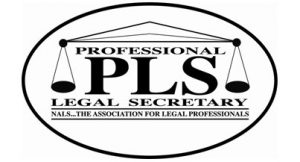
NALS: The Association for Legal Professionals is recognized for its professional certification programs for paralegals and its extensive networking and education events. NALS takes a broader approach to legal professionals, serving paralegals, legal secretaries, and other legal support professionals.
Professional Certification
NALS offers two certification pathways designed for different career stages and specialization interests.
Professional Paralegal (PP)
The Professional Paralegal designation requires passing the PP Examination and meeting one of these requirements:
- At least 5 years of experience performing paralegal or legal assistant duties
- Bachelor’s degree in paralegal studies
- Graduation from an ABA-approved Paralegal Program
- Graduation from an accredited paralegal program with at least 60 semester hours, including at least 15 semester hours in substantive law
- Bachelor’s degree in an unrelated field with at least 1 year of experience performing paralegal or legal assistant duties
The PP Examination is a one-day, four-part test covering Written Communications, Legal Knowledge and Skills, Ethics and Judgment Skills, and Substantive Law. The PP certificate remains valid for 5 years, with recertification requiring at least 75 hours of continuing legal education, including at least 50 hours in substantive areas and at least 5 hours in ethics.
NALS Specialty Certificate
The NALS Specialty Certificate targets practicing paralegals wanting to specialize in areas including Administrative Law, Appellate Law, Bankruptcy Law, Business Law, Civil Litigation, Contract Law, Corporate Law, Criminal Law, E-Discovery, Estate Planning/Probate, Family Law, Immigration Law, Insurance Law, Intellectual Property, Juvenile Law, Law Office Management, Personal Injury Law, Real Estate Law, and Trial Management.
You earn a Specialty Certificate by obtaining 50 continuing legal education credit hours within five years through attending seminars, workshops, and webinars, teaching seminars and workshops, authoring articles and publications, and completing postsecondary education courses. Certificates remain valid for 5 years.
Membership
NALS membership helps you stay current with the rapidly evolving paralegal profession. Membership provides opportunities to improve your skillset, network with colleagues, and advance your career. NALS offers community forums where paralegals share ideas and learn from one another. Many members also benefit from activities through NALS state associations.
Continuing Legal Education
NALS offers continuing legal education through state meetings, the NALS Education and Networking conference, and distance-based programs, including the WebEd Program and NALS OnDemand Library.
NALS WebEd provides monthly webinars on various subjects for both members and non-members. The NALS OnDemand Library offers valuable education resources, including past webinars, past issues of the NALS Docket e-magazine, and dozens of presentations from previous conference sessions.
Career Center
The NALS Career Center serves as a valuable resource for paralegals seeking their first or next position. Members can search for jobs by state, upload resumes, and receive free resume reviews.
American Alliance of Paralegals, Inc.
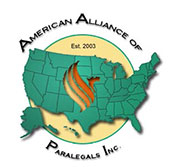
The American Alliance of Paralegals, Inc. is a national paralegal association offering both membership and certification opportunities with a unique approach to credentialing.
Professional Certification
As of 2017, the American Alliance had certified 74 paralegals. The American Alliance Certified Paralegal (AACP) certification relies solely on paralegal education and experience without requiring knowledge demonstration through examination. The AACP designation requires at least 5 years of substantive legal experience plus one of the following:
- Bachelor’s degree or advanced degree in any discipline
- Associate’s degree in paralegal studies from an ABA-approved program or a program that is a voting institutional member of the American Association for Paralegal Education
- Certificate from an ABA-approved paralegal program or a program that is a voting institutional member of the American Association for Paralegal Education
Membership
To become a member of the American Alliance of Paralegals, Inc., you must meet at least one of these requirements:
- Bachelor’s degree with 2 years of paralegal experience
- Bachelor’s degree with a 2-year paralegal certificate
- Associate’s degree, a 2-year paralegal certificate, and 2 years of paralegal experience
- Associate’s degree with 4 years of paralegal experience
- Paralegal certificate with 6 years of current paralegal experience
American Association of Legal Nurse Consultants (AALNC)
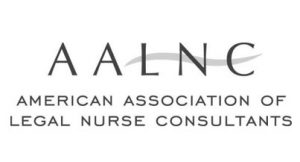
The American Association of Legal Nurse Consultants (AALNC) focuses on registered nurses serving in consulting capacities within the legal field, representing a specialized intersection of healthcare and legal expertise.
Certification
The AALNC provides legal nurse consultants with an opportunity to demonstrate expertise and competency by earning the Legal Nurse Consultant Certified (LNCC) designation. To qualify for the certification examination, you must be currently licensed as an RN in the U.S., have at least 5 years of RN experience, and have at least 2,000 hours of legal nurse consulting experience within the last 5 years. The certification examination, based on legal nurse consulting practice analysis, consists of 200 multiple-choice questions, taking about 4 hours to complete.
Membership
AALNC membership allows registered nurses to broaden their professional network through networking events and continuing education resources. Members are listed on the LNC Locator, a tool many attorneys use to find legal nurse consultants in their area by clinical and legal practice areas. You can become an RN member (for licensed registered nurses in the U.S.) or a non-RN member.
Career Center
The AALNC Career Center allows job seekers to search for positions by state. It also features a Job Search Resource Center with resources and articles on resume writing, interviewing, and career advancement.
Continuing Education Opportunities
The AALNC hosts events and educational opportunities supporting career advancement and professional commitment. In addition to national events like the AALNC annual forum and webinars, the AALNC offers the Legal Nurse Consulting Online Course, an interactive learning experience for individuals pursuing the legal nurse consulting profession. Webinars may be live, on-demand, or free. The AALNC Continuing Education Committee is accredited through the American Nurses Credentialing Center as a continuing nursing education provider.
Association of Legal Administrators (ALA)
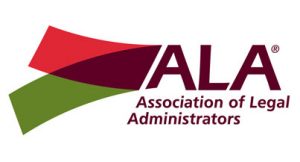
The Association of Legal Administrators (ALA) supports legal professionals managing law firms, corporate legal departments, and governmental agencies.
Professional Certification
The ALA offers the Certified Legal Manager professional designation for legal administrators proving advanced competency and knowledge. You may apply as either a Principal Administrator or Functional Specialist (HR manager, finance manager, etc.). You must be currently employed full-time in a legal organization (legal clinic, law firm, governmental agency, etc.) with at least 24 months of experience in a legal setting.
All candidates must meet the education requirements within 24 months of applying by completing at least 2 hours of coursework in each of the following five management categories: Writing Skills, Communication Skills, Self-Management Skills, Information Technology, and Organizational Development. Education requirements can be satisfied through courses, continuing education, seminars, or conferences offered by the ALA, the American Bar Association, or other professional associations.
Once accepted, you take the CLM certification examination, assessing knowledge of financial management, human resources management, legal industry/business management, and operations management. Learn more about the CLM designation.
Membership
Become an ALA member by meeting one of these requirements:
- Full-time legal administrator or support manager in law firms, legal clinics, or corporate legal departments
- Practicing lawyer with principal management responsibility
- Consultant to the legal industry
Associate membership is available if you don’t meet regular membership requirements but have an interest in law firm administration and management or are employed in jobs with similar management duties.
Job Bank
The ALA provides a Job Bank where both job seekers and employers can post and browse opportunities. You can search for legal administrator jobs by keyword, location, and category (e.g., marketing, human resources, financial management). It also provides career resources, including articles, a weekly Career Connection newsletter, and free resources through Robert Half Legal, including a career resources kit and a compensation and benefits survey.
Continuing Education Opportunities
The ALA promotes continuing education and professional development through annual and regional conferences and e-learning opportunities, including live and on-demand webinars, podcasts, and on-demand conference recordings.
National Paralegal Association (NPA)
The National Paralegal Association (NPA) is an organization that offers programs and benefits for individuals, corporate legal departments, law firms, training schools and colleges, and independent paralegals. While smaller in scope than NFPA, NALA, or NALS, NPA provides membership opportunities, employment networks, and networking resources for paralegals at various career stages.
Membership
Become an NPA member at the pre-student, student, regular, or associate/paralegal school level and enjoy access to professional development resources. Those interested must fill out an Individual Inquiry Form.
Professional Development Opportunities
The NPA Career Center is open to paralegals seeking their first or subsequent job. Use the database to search for paralegal jobs by state and submit resumes for free reviews. Within the Career Center is the Job Search Research Center, providing helpful articles on resume writing, interviewing, advancing in the field, and navigating social media and digital communication.
It also features “Ask the Experts,” where paralegals can post job search questions and receive answers from NPA career experts.
International Practice Management Association (IPMA)
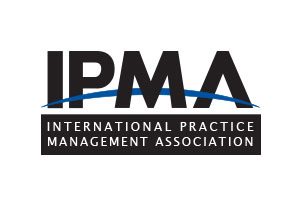
The International Practice Management Association, formerly the Legal Assistant Management Association, is an international association of managers of paralegal programs in law firms, governmental agencies, corporate legal departments, and judicial and legal agencies.
Membership
According to the IPMA, peer interaction is the key element to success, making membership crucial for paralegal managers and other practice support managers. You must be a member to enjoy IPMA resources, including full access to the membership directory, metropolitan chapters, mentor programs, LinkedIn discussion groups, position papers, business partner directories, and more.
Career and Professional Resources
Several IPMA resources are available to members and non-members, including annual compensation surveys for paralegals and managers, virtual webinars (live and recorded), the Career Center/Job Bank, which lists recent jobs in legal management, and access to the IPMA Annual Conference & Expo.
American Association for Paralegal Education (AAfPE)

The American Association for Paralegal Education promotes quality paralegal education through educational standards and professional growth. The AAfPE works alongside the American Bar Association and other professional associations to develop approval processes for paralegal education programs.
Services offered through the AAfPE include forums for professional improvement for paralegal educators, annual conferences and seminars, and technical assistance and consultation to educators, employers, and educational institutions. While membership and action in the AAfPE target institutions offering paralegal programs, students and practicing paralegals can benefit from their resources.
The AAfPE serves as an excellent resource for aspiring paralegals interested in understanding differences among paralegal programs, educational standards, and how paralegal programs are evaluated.
American Bar Association (ABA) Standing Committee on Paralegals
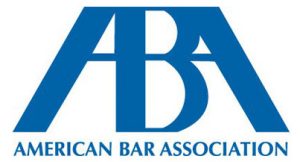
The ABA Standing Committee on Paralegals works to improve the American justice system by establishing ABA standards for paralegal education programs. The Standing Committee’s Approval Commission sets widely recognized standards for paralegal education programs and monitors developing trends in paralegal education. While the ABA does not regulate the paralegal profession itself, ABA approval of educational programs serves as an essential quality benchmark.
Institutions meeting ABA standards for paralegal education receive ABA approval. The Standing Committee maintains a directory of programs that have met the ABA approval process. Learn more about ABA approval.
How to Choose the Right Organization for You
With multiple paralegal organizations available, choosing the right one depends on your career stage, practice area, and professional goals. Here’s guidance to help you decide.
By Career Stage
| Career Stage | Best Choice | Why |
|---|---|---|
| Paralegal Student | NFPA, NALA, or NALS Student Membership | Lower membership costs, access to educational resources, networking opportunities, and understanding of certification requirements before graduating |
| Entry-Level (0-2 years) | NALA (CP) or NFPA (CORE) | Entry-level certifications that establish credentials early in your career, comprehensive study materials and support |
| Mid-Career (3-5 years) | NFPA (RP), NALA (ACP), or NALS (PP) | Advanced certifications that demonstrate expertise, specialty options for career focus, professional networking at your level |
| Experienced (6+ years) | NFPA (RP + Specialty), American Alliance (AACP) | Advanced credentials recognizing substantial experience, leadership opportunities within organizations, mentorship roles |
By Practice Area
- Corporate Law – NFPA’s Registered Paralegal (RP) and Corporate Law specialty certificate are highly valued in corporate legal departments
- Litigation – NALA’s CP certification with ACP in Civil Litigation or NFPA’s Litigation specialty
- Healthcare/Medical Law – AALNC for registered nurses combining healthcare and legal expertise
- Real Estate – NALA’s ACP in Real Estate or NFPA’s Real Estate specialty certificate
- Intellectual Property – NFPA or NALA specialty certifications in IP
- Family Law – NALA’s ACP in Family Law or NALS Specialty Certificate
- Traditional Law Firm Practice – NALS Professional Paralegal (PP) certification is well-recognized in law firms
By Budget Considerations
If you’re concerned about costs, consider these options:
- Start with membership – Join an organization first ($100-$300 annually) to access resources and decide if certification is proper for you
- Employer reimbursement – Many law firms and legal departments reimburse certification costs. Ask about this benefit before paying out of pocket.
- Student rates – If you’re currently enrolled in a paralegal program, take advantage of student membership rates (often 50% off)
- No-exam option – American Alliance’s AACP requires no exam fee, only membership and credential verification
- Scholarships – NFPA, NALA, and NALS all offer scholarships that cover exam fees. Check eligibility requirements
Regional Considerations
Some certifications carry more weight in certain regions. Before investing in certification:
- Research job postings in your area to see which certifications employers prefer or require
- Connect with local paralegals through state bar associations or local chapters
- Ask potential employers which credentials they value most
- Consider that California has unique paralegal regulations that may affect which credentials are most beneficial
Important Note: You’re not limited to one organization. Many paralegals maintain memberships in multiple organizations to access diverse resources, networking opportunities, and continuing education options. Consider starting with one primary organization aligned with your immediate career goals, then expanding as your career develops.
Frequently Asked Questions
Do I need to join a paralegal organization to work as a paralegal?
No, you don’t need to join a paralegal organization or obtain certification to work as a paralegal in most states. Paralegal work is largely unregulated by the government. Joining professional organizations and obtaining certifications is voluntary but can provide significant career benefits, including higher salaries, better job opportunities, networking connections, and continuing education resources.
Which paralegal certification is most recognized by employers?
NFPA’s Registered Paralegal (RP) and NALA’s Certified Paralegal (CP) are the two most widely recognized certifications nationwide. Large corporate legal departments and law firms often prefer one or both. The best certification for you depends on your practice area, geographic location, and employer preferences—research job postings in your area to see which certifications employers request most frequently.
How much do paralegal certifications cost?
Exam-based certification fees typically range from $250 to $500. You’ll also need to budget for study materials ($50-$200), annual membership fees ($100-$300), and recertification costs every 2-5 years ($50-$200). Some certifications, like the American Alliance’s AACP, are credential-based and don’t require exam fees. Many employers reimburse certification costs, and organizations like NFPA and NALA offer scholarships that cover exam fees. Total first-year investment for exam-based certifications usually runs $400-$1,000, including membership and materials.
Can I join multiple paralegal organizations at once?
Yes, many paralegals maintain memberships in multiple organizations to access diverse resources, networking opportunities, and continuing education options. It’s common to join both a national organization (like NFPA or NALA) and a state or local chapter. Consider your budget and how much time you can dedicate to participation before joining multiple organizations.
Do employers care about paralegal certifications when hiring?
Many employers value certifications and some prefer or require them. Large law firms and corporate legal departments often list certifications as preferred qualifications. Studies suggest certified paralegals may earn 10-15% more than non-certified counterparts, though this varies by region, employer, and practice area. Certification demonstrates commitment to the profession, validates your knowledge, and can give you a competitive edge in the job market.
How long does it take to prepare for a paralegal certification exam?
Most paralegals spend 3-6 months preparing for certification exams while working full-time. Preparation time varies based on your educational background, work experience, and study habits. Organizations provide study guides, practice exams, and preparation courses. If you’re a recent graduate of a paralegal program, you may need less preparation time. Working paralegals with several years of experience might focus preparation on exam format and test-taking strategies rather than content review.
What’s the difference between NFPA and NALA certifications?
NFPA offers the CORE Registered Paralegal (entry-level) and Registered Paralegal (advanced) certifications, along with specialty certificates in five practice areas. NALA offers the Certified Paralegal (CP) as its foundational certification and Advanced Certified Paralegal (ACP) specialties in 26 practice areas. NFPA certifications require recertification every 2 years with 8-12 CLE hours, while NALA’s CP requires 50 CLE hours every 5 years. Both are nationally recognized, so the choice often depends on employer preference in your region and which specialty areas interest you.
Key Takeaways
- Professional paralegal organizations provide valuable certification programs, continuing education, networking opportunities, and career resources that can significantly advance your career. Studies suggest certification may increase earning potential by 10-15%, though results vary by region and employer.
- NFPA, NALA, and NALS are the three most prominent and most recognized paralegal organizations, each offering different certification pathways, membership benefits, and specialty focus areas suited to different career stages and practice areas.
- Exam-based certifications typically cost $250-$500 plus $50-$200 annual maintenance fees, though some credential-based options have different fee structures. Many employers offer reimbursement, and organizations provide scholarships to offset these costs.
- Choose your organization based on your career stage, practice area specialization, geographic location, and budget—you’re not limited to one organization, and many paralegals maintain multiple memberships for broader access to resources.
- While joining professional organizations and obtaining certification are voluntary in most states, these credentials demonstrate your commitment to the profession, validate your expertise, and provide a competitive advantage in the job market.
- Regional variations exist in which certifications employers prefer, so research local job postings and connect with paralegals in your area before investing in certification to ensure you choose credentials most valued by employers in your region.
Ready to Start Your Paralegal Career?
Explore ABA-approved paralegal programs in your state and take the first step toward joining these prestigious professional organizations.
Disclaimer: Certification requirements, costs, and organizational benefits change over time. Regional variations exist in which certifications employers prefer and value. Always verify current information directly with the certifying organization and research employer preferences in your jurisdiction before investing in certification. This information is for educational purposes and does not constitute career advice.
Salary Disclaimer: 2024 US Bureau of Labor Statistics salary and job market figures for Paralegals and Legal Assistants reflect state and national data, not school-specific information. Conditions in your area may vary. Data accessed December 2025.





